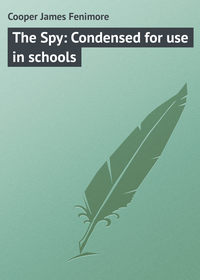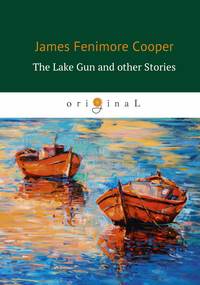 полная версия
полная версияMercedes of Castile: or, The Voyage to Cathay
The quick, hurried glance of intelligence and gratification, that passed between Mercedes and her guardian, betrayed the interest they felt in this question, while the latter answered, as became her duty and her respect for her mistress —
"You remember, Señora, that he was written for, by Fray Juan Perez, Your Highness' ancient confessor, who journeyed all the way from his convent of Santa Maria de Rabida, in Andalusia, to intercede in his behalf, that his great designs might not be lost to Castile."
"Thou thinkest his designs, then, great, Daughter-Marchioness?"
"Can any think them otherwise, Señora? They seem reasonable and natural, and if just, is it not a great and laudable undertaking to extend the bounds of the church, and to confer honor and wealth on one's own country? My enthusiastic ward, Mercedes de Valverde, is so zealous in behalf of this navigator's great project, that, next to her duty to her God, and her duty to her sovereigns, it seemeth to make the great concern of her life."
The queen turned a smiling face toward the blushing girl who was the subject of this remark, and she gazed at her, for an instant, with the expression of affection that was so wont to illuminate her lovely countenance when dwelling on the features of her own daughters.
"Dost thou acknowledge this, Doña Mercedes?" she said; "hath Colon so convinced thee, that thou art thus zealous in his behalf?"
Mercedes arose, respectfully, when addressed by the queen, and she advanced a step or two nearer to the royal person before she made any reply.
"It becometh me to speak modestly, in this presence," said the beautiful girl; "but I shall not deny that I feel deep concern for the success of the Señor Colon. The thought is so noble, Señora, that it were a pity it should not be just."
"This is the reasoning of the young and generous-minded; and I confess myself, Beatrice, almost as childish as any, on this matter, at times – Colon, out of question, is still here?"
"Indeed he is, Señora," answered Mercedes, eagerly, and with a haste she immediately repented, for the inquiry was not made directly to herself; "I know of one who hath seen him as lately as the day the troops took possession of the town."
"Who is that person?" asked the queen, steadily, but not severely, her eye having turned again to the face of the girl, with an interest that continued to increase as she gazed.
Mercedes now bitterly regretted her indiscretion, and, in spite of a mighty effort to repress her feelings, the tell-tale blood mounted to her temples, ere she could find resolution to reply.
"Don Luis de Bobadilla, Señora, the nephew of my guardian, Doña Beatriz," she at length answered; for the love of truth was stronger in this pure-hearted young creature, even, than the dread of shame.
"Thou art particular, Señorita," Isabella observed calmly, severity seldom entering into her communication with the just-minded and good; "Don Luis cometh of too illustrious a house to need a herald to proclaim his alliances. It is only the obscure that the world doth not trouble itself about. Daughter-Marchioness," relieving Mercedes from a state scarcely less painful than the rack, by turning her eyes toward her friend, "this nephew of thine is a confirmed rover – but I doubt if he could be prevailed on to undertake an expedition like this of Colon's, that hath in view the glory of God and the benefit of the realm."
"Indeed, Señora" – Mercedes repressed her zeal by a sudden and triumphant effort.
"Thou wert about to speak, Doña Mercedes," gravely observed the queen.
"I crave Your Highness' forgiveness. It was improperly, as your own words were not addressed to me."
"This is not the court of the Queen of Castile, daughter, but the private room of Isabella de Trastamara," said the queen, willing to lessen the effect of what had already passed. "Thou hast the blood of the Admiral of Castile in thy veins, and art even akin to our Lord the King. Speak freely, then."
"I know your gracious goodness to me, Señora, and had nearly forgotten myself, under its influence. All I had to say was, that Don Luis de Bobadilla desireth exceedingly that the Señor Colon might get the caravels he seeketh, and that he himself might obtain the royal permission to make one among the adventurers."
"Can this be so, Beatriz?"
"Luis is a truant, Señora, beyond a question, but it is not with ignoble motives. I have heard him ardently express his desire to be one of Colon's followers, should that person be sent by Your Highness in search of the land of Cathay."
Isabella made no reply, but she laid her homely work in her lap, and sat musing, in pensive silence, for several minutes. During this interval, none near her presumed to speak, and Mercedes retired, stealthily, to her stool, at the feet of the Infanta. At length the queen arose, and, crossing the room, she approached the table where Don Fernando was still busily engaged with the pen. Here she paused a moment, as if unwilling to disturb him; but soon, laying a hand kindly on his shoulder, she drew his attention to herself. The king, as if conscious whence such familiarity could alone proceed, looked around immediately, and, rising from his chair, he was the first to speak.
"These Moriscoes need looking to," he said, betraying the direction that his thoughts had so early taken toward the increase of his power – "I find we have left Abdallah many strongholds in the Apulxarras, that may make him a troublesome neighbor, unless we can push him across the Mediterranean" —
"Of this, Fernando, we will converse on some other opportunity," interrupted the queen, whose pure mind disliked every thing that even had an approach to a breach of faith. "It is hard enough for those who control the affairs of men, always to obey God and their own consciences, without seeking occasions to violate their faith. I have come to thee, on another matter. The hurry of the times, and the magnitude of our affairs, have caused us to overlook the promise given to Colon, the navigator" —
"Still busied with thy needle, Isabella, and for my comfort," observed the king, playing with the shirt that his royal consort had unconsciously brought in her hand; "few subjects have wives as considerate and kind as thou!"
"Thy comfort and happiness stand next to my duty to God and the care of my people," returned Isabella, gratified at the notice the King of Aragon had taken of this little homage of her sex, even while she suspected that it came from a wish to parry the subject that was then uppermost in her thoughts. "I would do naught in this important concern, without thy fullest approbation, if that may be had; and I think it toucheth our royal words to delay no longer. Seven years are a most cruel probation, and, unless we are active, we shall have some of the hot-blooded young nobles of the kingdom undertaking the matter, as their holiday sports."
"Thou say'st true, Señora, and we will refer the subject, at once, to Fernando de Talavera, yonder, who is of approved discretion, and one to be relied on." As the king spoke, he beckoned to the individual named, who immediately approached the royal pair. "Archbishop of Granada," continued the wily king, who had as many politic arts as a modern patriot intently bent on his own advancement – "Archbishop of Granada, our royal consort hath a desire that this affair of Colon should be immediately inquired into, and reported on to ourselves. It is our joint command that you, and others, take the matter, before the next twenty-four hours shall pass, into mature consideration and inquiry, and that you lay the result before ourselves. The names of your associates shall be given to you in the course of the day."
While the tongue of Ferdinand was thus instructing the prelate, the latter read in the expression of the monarch's eye, and in the coldness of his countenance, a meaning that his quick and practiced wits were not slow in interpreting. He signified his dutiful assent, however; received the names of his associates in the commission, of whom Isabella pointed out one or two, and then waited to join in the discourse.
"This project of Colon's is worthy of being more seriously inquired into," resumed the king, when these preliminaries were settled, "and it shall be our care to see that he hath all consideration. They tell me the honest navigator is a good Christian."
"I think him devotedly so, Don Fernando. He hath a purpose, should God prosper his present undertaking, to join in a new effort to regain the holy sepulchre."
"Umph! Such designs may be meritorious, but ours is the true way to advance the faith – this conquest of our own. We have raised the cross, my wife, where the ensigns of infidelity were lately seen, and Granada is so near Castile that it will not be difficult to maintain our altars. Such, at least, are the opinions of a layman – holy prelate – on these matters."
"And most just and wise opinions are they, Señor," returned the archbishop. "That which can be retained, it is wisest to seek, for we lose our labors in gaining things that Providence hath placed so far beyond our control, that they do not seem designed for our purposes."
"There are those, my Lord Archbishop," observed the queen, "who might argue against all attempts to recover the holy sepulchre, hearing opinions like these, from so high authority!"
"Then, Señora, they would misconceive that authority," the politic prelate hurriedly replied. "It is well for all Christendom, to drive the Infidels from the Holy Land; but for Castile it is better to dispossess them of Granada. The distinction is a very plain one, as every sound casuist must admit."
"This truth is as evident to our reason," added Ferdinand, casting a look of calm exultation out at a window, "as that yonder towers were once Abdallah's, and that they are now our own!"
"Better for Castile!" repeated Isabella, in the tones of one who mused. "For her worldly power better, perhaps, but not better for the souls of those who achieve the deed – surely, not better for the glory of God!"
"My much-honored wife, and beloved consort" – said the king.
"Señora" – added the prelate.
But Isabella walked slowly away, pondering on principles, while the eyes of the two worldings she left behind her, met, with the sort of free-masonry that is in much request among those who are too apt to substitute the expedient for the right. The queen did not return to her seat, but she walked up and down that part of the room which the archbishop had left vacant when he approached herself and her husband. Here she remained alone for several minutes, even Ferdinand holding her in too much reverence to presume to disturb her meditations, uninvited. The queen several times cast glances at Mercedes, and, at length, she commanded her to draw near.
"Daughter," said Isabella, who frequently addressed those she loved by this endearing term, "thou hast not forgotten thy freely-offered vow?"
"Next to my duty to God, Señora, I most consider my duty to my sovereign."
Mercedes spoke firmly, and in those tones that seldom deceive. Isabella riveted her eyes on the pale features of the beautiful girl, and when the words just quoted were uttered, a tender mother could not have regarded a beloved child with stronger proofs of affection.
"Thy duty to God overshadoweth all other feelings, daughter, as is just," answered the queen; "thy duty to me is secondary and inferior. Still, thou and all others, owe a solemn duty to your sovereign, and I should be unfit for the high trust that I have received from Providence, did I permit any of these obligations to lessen. It is not I that reign in Castile, but Providence, through its humble and unworthy instrument. My people are my children, and I often pray that I may have heart enough to hold them all. If princes are sometimes obliged to frown on the unworthy, it is but in humble and distant imitation of that Power which cannot smile on evil."
"I hope, Señora," said the girl, timidly, observing that the queen paused, "I have not been so unfortunate as to displease you; a frown from Your Highness would indeed be a calamity!"
"Thou? No, daughter; I would that all the maidens of Castile, noble and simple, were of thy truth, and modesty, and obedience. But we cannot permit thee to become the victim of the senses. Thou art too well taught, Doña Mercedes, not to distinguish between that which is brilliant and that which is truly virtuous" —
"Señora!" cried Mercedes, eagerly – then checking herself, immediately, for she felt it was a disrespect to interrupt her sovereign.
"I listen to what thou wouldst say, daughter," Isabella answered, after pausing for the frightened girl to continue. "Speak freely; thou addressest a parent."
"I was about to say, Señora, that if all that is brilliant is not virtuous, neither is all that is unpleasant to the sight, or what prudence might condemn, actually vicious."
"I understand thee, Señorita, and the remark hath truth in it. Now, let us speak of other things. Thou appearest to be friendly to the designs of this navigator, Colon?"
"The opinion of one untaught and youthful as I, can have little weight with the Queen of Castile, who can ask counsel of prelates and learned churchmen, besides consulting her own wisdom;" Mercedes modestly answered.
"But thou thinkest well of his project; or have I mistaken thy meaning?"
"No, Señora, I do think well of Colon's scheme; for to me it seemeth of that nobleness and grandeur that Providence would favor, for the good of man and the advancement of the church."
"And thou believest that nobles and cavaliers can be found willing to embark with this obscure Genoese, in his bold undertaking?"
The queen felt the hand that she affectionately held in both her own, tremble, and when she looked at her companion she perceived that her face was crimsoned and her eyes lowered. But the generous girl thought the moment critical for the fortunes of her lover, and she rallied all her energies in order to serve his interests.
"Señora, I do," she answered, with a steadiness that both surprised and pleased the queen, who entered into and appreciated all her feelings; "I think Don Luis de Bobadilla will embark with him; since his aunt hath conversed freely with him on the nature and magnitude of the enterprise, his mind dwelleth on little else. He would be willing to furnish gold for the occasion, could his guardians be made to consent."
"Which any guardian would be very wrong to do. We may deal freely with our own, but it is forbidden to jeopard the goods of another. If Don Luis de Bobadilla persevere in this intention, and act up to his professions, I shall think more favorably of his character than circumstances have hitherto led me to do."
"Señora!"
"Hear me, daughter; we cannot now converse longer on this point, the council waiting my presence, and the king having already left us. Thy guardian and I will confer together, and thou shalt not be kept in undue suspense; but Mercedes de Valverde" —
"My Lady the Queen" —
"Remember thy vow, daughter. It was freely given, and must not be hastily forgotten."
Isabella now kissed the pale cheek of the girl and withdrew, followed by all the ladies; leaving the half-pleased and yet half-terrified Mercedes standing in the centre of the vast apartment, resembling a beautiful statue of Doubt.
CHAPTER VII
"He that of such a height hath built his mind,And reared the dwelling of his thoughts so strongAs neither fear nor hope can shake the frameOf his resolved powers."Daniel.The following day the Alhambra was crowded with courtiers as usual; applicants for favors, those who sought their own, and those who solicited the redress of imaginary wrongs. The ante-chambers were thronged, and the different individuals in waiting jealously eyed each other, as if to inquire how far their neighbors would be likely to thwart their several views or to advance their wishes. Men bowed, in general, coldly and with distrust; and the few that did directly pass their greetings, met with the elaborated civility that commonly characterizes the intercourse of palaces.
While curiosity was active in guessing at the business of the different individuals present, and whispers, nods, shrugs of the shoulders, and meaning glances, passed among the old stagers, as they communicated to each other the little they knew, or thought they knew, on different subjects, there stood in the corner of the principal apartment, one in particular, who might be distinguished from all around him, by his stature, the gravity and dignity of his air, and the peculiar sort of notice that he attracted. Few approached him, and they that did, as they turned their backs, cast those glances of self-sufficiency and ridicule about them, that characterize the vulgar-minded when they fancy that they are deriding or sneering in consonance with popular opinion. This was Columbus, who was very generally regarded by the multitude as a visionary schemer, and who necessarily shared in that sort of contemptuous obloquy that attaches itself to the character. But even the wit and jokes of the crowd had been expended upon this subject, and the patience of those who danced attendance was getting to be exhausted, when a little stir at the door announced the approach of some new courtier. The manner in which the throng quickly gave way, denoted the presence of some one of high rank, and presently Don Luis de Bobadilla stood in the centre of the room.
"It is the nephew of Her Highness' favorite," whispered one.
"A noble of one of the most illustrious families of Castile," said another; "but a fitting associate of this Colon, as neither the authority of his guardians, the wishes of the queen, nor his high station, can keep him from the life of a vagabond."
"One of the best lances in Spain, if he had the prudence and wisdom to turn his skill to profit," observed a third.
"That is the youthful knight who hath so well deported himself in this last campaign," growled an inferior officer of the infantry, "and who unhorsed Don Alonso de Ojeda in the tourney; but his lance is as unsteady in its aim, as it is good in the rest. They tell me he is a rover."
As if purposely to justify this character, Luis looked about him anxiously a moment, and then made his way directly to the side of Colon. The smiles, nods, shrugs, and half-suppressed whispers that followed, betrayed the common feeling; but a door on the side of the closet opening, all eyes were immediately bent in that direction, and the little interruption just mentioned was as soon forgotten.
"I greet you, Señor," said Luis, bowing respectfully to Columbus. "Since our discourse of last evening I have thought of little besides its subject, and have come hither to renew it."
That Columbus was pleased by this homage, appeared in his eye, his smile, and the manner in which he raised his body, as if full of the grandeur of his own designs; but he was compelled to defer the pleasure that it always gave him to dilate on his enterprise.
"I am commanded hither, noble Señor," he answered, cordially, "by the holy Archbishop of Granada, who, it seemeth, hath it in charge from their Highnesses, to bring my affair to a speedy issue, and who hath named this very morning for that purpose. We touch upon the verge of great events: the day is not distant, when this conquest of Granada will be forgotten, in the greater importance of the mighty things that God hath held in reserve!"
"By San Pedro, my new patron! I do believe you, Señor. Cathay must lie at or near the spot you have named, and your own eyes shall not see it, and its gorgeous stories of wealth, sooner than mine. Remember Pedro de Muños, I pray you, Señor Colon."
"He shall not be forgotten, I promise you, young lord; and all the great deeds of your ancestors will be eclipsed by the glory achieved by their son. But I hear my name called; we will talk of this anon."
"El Señor Christoval Colon!" was called by one of the pages, in a loud authoritative voice, and the navigator hurried forward, buoyed up with hope and joy.
The manner in which one so generally regarded with indifference, if not with contempt, had been selected from all that crowd of courtiers, excited some surprise; but as the ordinary business of the antechamber went on, and the subordinates of office soon appeared in the rooms, to hear solicitations and answer questions, the affair was quickly forgotten. Luis withdrew disappointed, for he had hoped to enjoy another long discourse with Columbus, on a subject which, as it was connected with his dearest hopes, now occupied most of his thoughts. We shall leave him, however, and all in the ante-chambers, to follow the great navigator further into the depths of the palace.
Fernando de Talavera had not been unmindful of his orders. Instead, however, of associating with this prelate, men known to be well disposed to listen to the propositions of Columbus, the king and queen had made the mistake of choosing some six or eight of their courtiers, persons of probity and of good general characters, but who were too little accustomed to learned research, properly to appreciate the magnitude of the proposed discoveries. Into the presence of these distinguished nobles and churchmen was Columbus now ushered, and among them is the reader to suppose him seated. We pass over the customary ceremonies of the introduction, and proceed at once to the material part of the narrative. The Archbishop of Granada was the principal speaker on the part of the commissioners.
"We understand, Señor Colon," continued the prelate, "should you be favored by their Highnesses' power and authority, that you propose to undertake a voyage into the unknown Atlantic, in quest of the land of Cathay and the celebrated island of Cipango?"
"That is my design, holy and illustrious prelate. The matter hath been so often up between the agents of the two sovereigns and myself, that there is little occasion to enlarge on my views."
"These were fully discussed at Salamanca, of a verity, where many learned churchmen were of your way of thinking, Señor, though more were against it. Our Lord the King, and our Lady the Queen, however, are disposed to view the matter favorably, and this commission hath been commanded that we might arrange all previous principles, and determine the rights of the respective parties. What force in vessels and equipments do you demand, in order to achieve the great objects you expect, under the blessing of God, to accomplish?"
"You have well spoken, Lord Archbishop; it will be by the blessing of God, and under his especial care, that all will be done, for his glory and worship are involved in the success. With so good an ally on my side, little worldly means will be necessary. Two caravels of light burden are all I ask, with the flag of the sovereigns, and a sufficiency of mariners."
The commissioners turned toward each other in surprise, and while some saw in the moderate request the enthusiastic heedlessness of a visionary, others detected the steady reliance of faith.
"That is not asking much, truly," observed the prelate, who was among the first; "and, though these wars have left us of Castile with an exhausted treasury, we could compass that little without the aid of a miracle. The caravels might be found, and the mariners levied, but there are weighty points to determine before we reach that concession. You expect, Señor, to be intrusted with the command of the expedition, in your own person?"
"Without that confidence I could not be answerable for success. I ask the full and complete authority of an admiral, or a sea-commander, of their Highnesses. The force employed will be trifling in appearance, but the risks will be great, and the power of the two crowns must completely sustain that of him on whose shoulders will rest the entire weight of the responsibility."
"This is but just, and none will gainsay it. But, Señor, have you thought maturely on the advantages that are to accrue to the sovereigns, should they sustain you in this undertaking?"
"Lord Archbishop, for eighteen years hath this subject occupied my thoughts, and employed my studies, both by day and by night. In the whole of that long period have I done little that hath not had a direct bearing on the success of this mighty enterprise. The advantages to all concerned, that will flow from it, have, therefore, scarce been forgotten."
"Name them, Señor."









